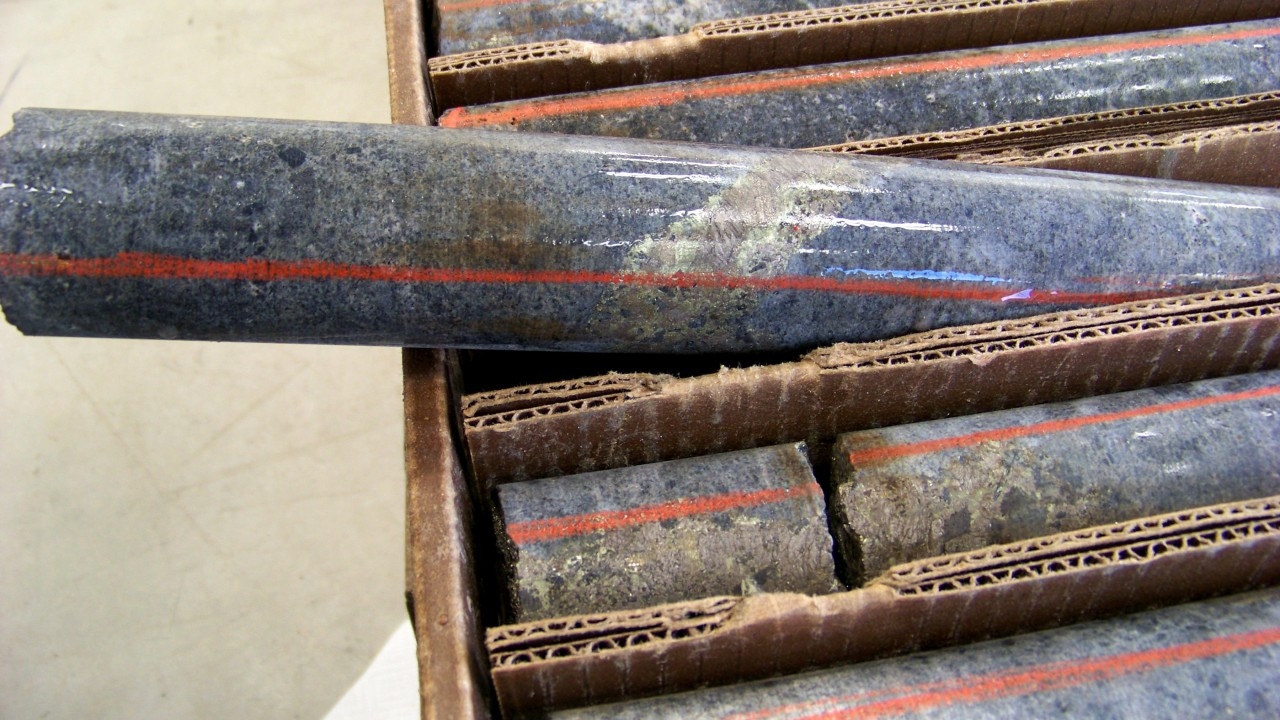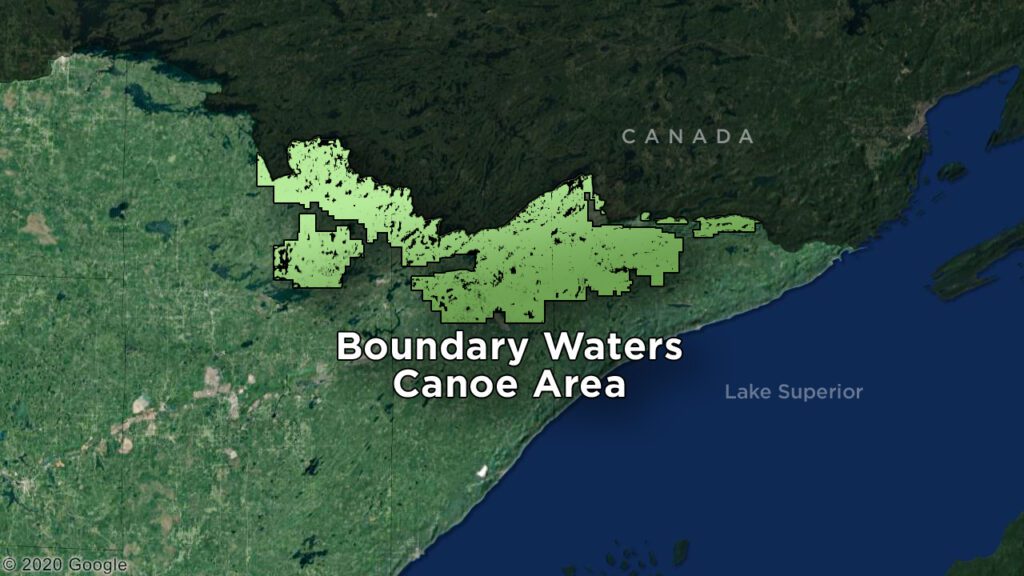US Interior secretary’s order curbs future of Twin Metals mine project

FILE - In this Oct. 4, 2011, file photo, a core sample drilled from underground rock near Ely, Minn., shows a band of shiny minerals containing copper, nickel and precious metals, center, that Twin Metals Minnesota LLC, hopes to mine near the Boundary Waters Canoe Area Wilderness in northeastern Minnesota. The Biden administration moved Thursday, Jan. 26, 2023, to protect the pristine Boundary Waters Canoe Area Wilderness in northeastern Minnesota from future mining, dealing a potentially fatal blow to the proposed Twin Metals copper-nickel project. (AP Photo/Steve Karnowski, File)
The Biden administration moved Thursday to protect northeastern Minnesota’s pristine Boundary Waters Canoe Area Wilderness from future mining, dealing a potentially fatal blow to a copper-nickel project.
Interior Secretary Deb Haaland signed an order closing over 350 square miles (900 square kilometers) of the Superior National Forest, in the Rainy River Watershed around the town of Ely, to mineral and geothermal leasing for 20 years, the longest period the department can sequester the land without congressional approval.
The order is “subject to existing valid rights,” but the Biden administration contends that Twin Metals Minnesota lost its rights last year, when the department rescinded a Trump administration decision to reinstate federal mineral rights leases that were critical to the project. Twin Metals, which is owned by the Chilean mining giant Antofagasta, filed suit in August to try to reclaim those rights.
“Protecting a place like Boundary Waters is key to supporting the health of the watershed and its surrounding wildlife, upholding our Tribal trust and treaty responsibilities, and boosting the local recreation economy,” Haaland said in a statement. “With an eye toward protecting this special place for future generations, I have made this decision using the best available science and extensive public input.”
The proposed underground mine would be built southeast of Ely, near Birch Lake, which flows into the Boundary Waters. The project has been battered by shifting political winds. The Obama administration, in its final weeks, chose not to renew the two leases, which had dated back more than 50 years. The Trump administration reversed that decision and reinstated the leases. But the Biden administration canceled the leases last January after the U.S. Forest Service in October 2021 relaunched the review and public engagement process for the 20-year mining moratorium.
While the Biden administration last year committed itself to expanding domestic sources of critical minerals and metals for the clean energy economy, it made clear Thursday that it considers Boundary Waters to be a unique area worthy of special protections.
Twin Metals did not immediately respond to messages seeking comment. The company and its supporters say the project is critical for securing domestic sources of copper, nickel and other minerals needed for wind and solar power and electric vehicles. And they say the mine would create more than 750 high-wage mining jobs plus 1,500 spinoff jobs in the region.
Twin Metals says it can mine safely without generating acid mine drainage that the Biden administration and environmentalists say makes the $1.7 billion project an unacceptable risk to the wilderness. Twin Metals says its design would limit the exposure of the sulfide-bearing ore to the effects of air and water.

The 1,700 square mile (4,400 square kilometer) Boundary Waters Canoe Area is the most-visited federally designated wilderness area in the U.S. It draws more than 150,000 visitors from around the world who paddle its more than 1,200 miles (1,900 kilometers) of canoe routes and over 1,100 lakes. According to the Interior Department, it contributes over $17 million annually to the outdoor recreation and tourism economy in northeastern Minnesota. Three Ojibwe tribes exercise treaty rights in the area covered by the moratorium.
“I applaud Secretary Haaland’s decision to protect the long-term health of the Rainy River watershed, including the irreplaceable Boundary Waters Canoe Area Wilderness,” Agriculture Secretary Tom Vilsack, who oversees the Forest Service, said in the administration’s statement. “This landscape is an international resource renowned for its multitude of recreational opportunities and provides millions of visitors with unparalleled wilderness experiences.”
The order does not affect two other proposed copper-nickel projects in northeastern Minnesota — the PolyMet mine near Babbitt and Hoyt Lakes and the Talon Metals mine near Tamarack — which lie in different watersheds.
Minnesota’s District 8 Congressman Pete Stauber released the following statement Thursday afternoon:
“Today is an attack on our way of life. Joe Biden banned mining in 225,000 acres of Minnesota’s Iron Range, and locked up development of taconite, copper, nickel, cobalt, platinum-group elements, and more. Unfortunately, this harm to our country and our future has become the norm, as this President’s goal is to put America last. Not even one month ago, Joe Biden signed an agreement to fund mining projects in Chinese-owned mines in the Congo, where over 40,000 children work as slaves in forced labor and inhumane conditions with no environmental protections. Meanwhile today’s mining ban nullifies a Project Labor Agreement with the local building and construction trade unions. America needs to develop our vast mineral wealth, right here at home, with high-wage, union protected jobs instead of continuing to send American taxpayer dollars to countries like the Congo that use child slave labor. The only winner here is China, as Joe Biden continues to hand our foreign adversaries every advantage possible. I can assure you that this Administration, from the President to the Forest Service, to the Interior Department, will answer for the pain they elected to cause my constituents today.”
Rep. Pete Stauber (R-Minn.)
Minnesota’s District 4 Representative Betty McCollum issued the following statement:
“Secretary of the Interior Deb Haaland has signed a Public Land Order today officially withdrawing more than 225,000 acres from mineral leasing – a move that will protect the Boundary Waters, which sits within the Rainy River watershed, from the dangers of toxic sulfide-ore mining pollution and will preserve America’s most visited wilderness area for the next generation.
“The freshwater in this area is pristine, and contamination from heavy metals and sulfuric acid from mine tailings would cause irreparable harm that would quickly spread through the Boundary Waters’ 1.1 million acres of interconnected lakes and streams. This would damage the unique wildlife, hurt the region’s tourism industry and recreation-based economy, and preclude hundreds of thousands of visitors from Minnesota and across the country from enjoying this wilderness. Once damaged, it cannot be restored.
“I applaud Sec. Haaland for this action, which is an enormous step in safeguarding the Boundary Waters. Unfortunately, it can be reversed by another administration, which is why I am committed to reintroducing the Boundary Waters Wilderness Protection and Pollution Prevention Act in the 118th Congress to continue working to protect this national treasure in perpetuity.”
Rep. Betty McCollum (D-Minn.)
Sen. Tina Smith offered the following statement Thursday:
“The Boundary Waters Canoe Area Wilderness is a national treasure and a precious resource. In 2016, the federal government began a process to determine whether the watershed that drains into the BWCA is appropriate for copper sulfide mining. The answer, according to the science, is no. When President Trump tried to hijack the evaluation process, I objected, and I was grateful when President Biden’s Administration took action to restart this process. Today marks the culmination of that effort, and a landmark in protecting this irreplaceable wilderness area.
“Minnesota has a rich mining tradition, and we will continue to provide valuable minerals to the world, thanks to hard-working Minnesotans. We are a mining state, but mining is not appropriate everywhere.
“I want to thank all of the Minnesotans who have fought passionately to preserve the precious landscape in northeastern Minnesota, particularly the young people who have brought so much energy to this effort.”
Sen. Tina Smith (D-Minn.)
Minnesota lawmakers in the Iron Range Delegation also sent a letter to Biden saying in part, “Today’s order will cause Minnesota and our communities to lose thousands of potential jobs that would have resulted in future mining projects, billions of dollars in future investment in the people of northeast Minnesota, and billions of dollars in revenues that would support students through Minnesota’s School Trust Lands.”
See their full letter below or by clicking here.